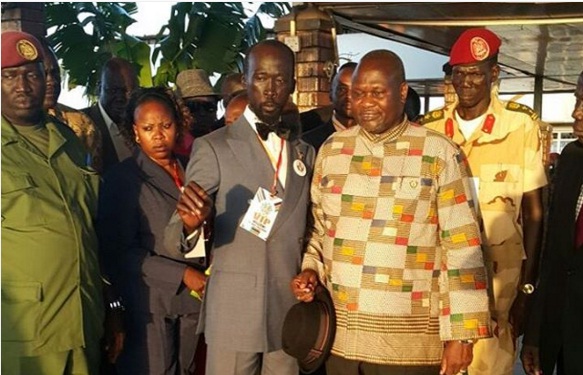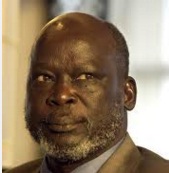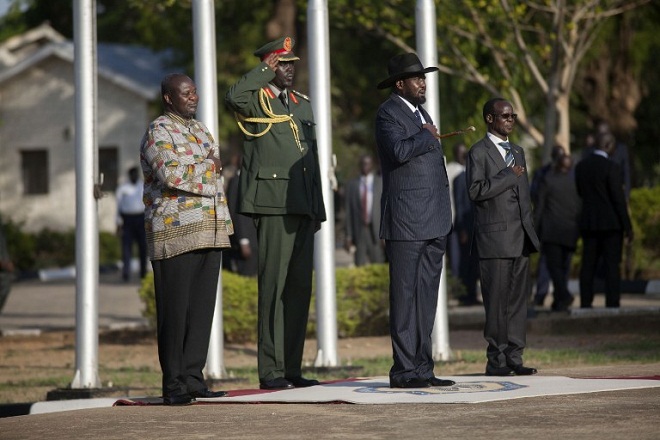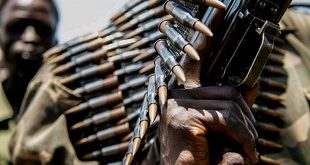
Mabior Garang de Mabior, son of the founder of the Sudan People’s Liberation Movement (SPLM) John Garang, was named on the cabinet as South Sudan President Salva Kiir named a Transitional Government yesterday.
Mabior Garang de Mabior, new South Sudan minsiter of Water Resources and Irrigation, was one of a number of Dinka intellectuals to have supported the rebellion of Riek Machar. He has been serving as spokesman for the SPLM-IO. This is his first senior position in government.

The Sudan Tribune and Radio Tamazuj reported last night that President Salva Kiir dissolved his cabinet and named 30 appointees for the cabinet of the Transitional Government of National Unity (TGONU). Newly re-appointed Vice President Riek Machar nominated 10 from the SPLM-In Opposition.
Announced over state broadcasters, Radio Tamazuj reported that “Kiir’s decree appointed ministers to thirty ministries which are split between SPLM, SPLM-IO, SPLM-G10 Former Detainees group, and other political parties.”
Sudan Tribune reported that “four factions of the South Sudan’s former warring parties and political rivals, turned peace partners, have finally formed the long-awaited transitional government of national unity (TGoNU) to administer the country for the next two and a half years, pending elections.”
The new cabinet has been named as agreed in the peace agreement, two days after the return to Juba of strongman Machar, newly sworn in First Vice President.
It is eight months after a peace agreement was signed in August 2015 to end 21 months of a civil war that started as an internal power struggle on December 15, 2013. It has killed tens of thousands and displaced millions more.

According to The Sudan Tribune, “although President Kiir’s faction will continue to dominate the cabinet, Machar on the other hand will have not only the majority of the opposition members in the cabinet, but also the majority in the opposition membership in the national parliament.”
“There are mechanisms put in place for decision making processes in the cabinet in passing its resolutions.”
Kiir loyalists Kuol Manyang remains as defence minister and David Deng Athorbei as finance minster, who must try to rebuild an economy left in ruins by over two years of war, adds AFP.
The key petroleum portfolio was handed to Dak Duop Bichok. The foreign ministry goes to Deng Alor, a post he held under a united Sudan, before South Sudan won its independence in 2011.
Alor was a member of a group called the “former detainees”, influential leaders arrested when war broke out, but later released after regional pressure.
The ministerial appointees are:
Martin Elia Lomoro – Cabinet Affairs
Deng Alor – Foreign Affairs
Kuol Manyang Juuk – Defense and Veteran’s Affairs
Alfred Ladu Gore – Interior
Paulino Wanawille – Justice and Constitutional Affairs
Obutu Mamur Mete – Office of the President for National Security
Peter Bashir Gbandi – Parliamentary Affairs
Michael Makuei Lueth – Information, Communication, Technology, and Postal Service
Richard K Mula – Federal Affairs
Mayiik Ayii Deng – Office of the President
David Deng Athorbei – Finance and Planning
Dak Doth Bishok – Petroleum
Taban Deng Gai – Mining
Lam Akol Ajawin – Agriculture and Food Security
James Janga Duku – Livestock and Fisheries
Stephen Dhieu Dau – Trade and Industry
Dhieu Mathok Deng – Energy and Dams
John Luk Jok – Transport
Rebecca Joshua Okwaci – Roads and Bridges
Josephine Napwon – Environment and Forestry
Mary Alphonse Nadio Lodira – Land, Housing, and Urban Development
Mabior Garang de Mabior – Water Resources and Irrigation
Jemma Nunu Kumba – Wildlife Conservation and Tourism
Peter Adwok Nyaba – Higher Education, Science, and Technology
Deng Deng Hoc – General Education and Instruction
Riek Gai Kok – Health
Peter Marcello Lasir Jealingo – Labor, Public Service, and Human Resource Development
Awut Deng Acuil – Gender, Child, and Social Welfare
Nadia Arop Dudi – Culture, Youth, and Sports
Hussein Mar Nyot – Humanitarian Affairs and Disaster Management
The following new deputy ministers were also appointed:
Cirino Heteng Ofuho – Foreign Affairs and International Cooperation
David Yau Yau – Defense and Veteran’s Affairs
Gabriel Duop Lam – Interior
Martinson Oturomoi – Justice and Constitutional Affairs
Akol Paul Kordit – Information, Communication, Technology, and Postal Service
Mary Jervas Yak – Finance and Planning
Kornelio Kon Ngu – Agriculture and Food Security
Elizabeth Deng Achuai – Labor, Public Service, and Resource Development
Kiir also appointed a Grade One Ambassador:
John Andruga Duku
 The Independent Uganda: You get the Truth we Pay the Price
The Independent Uganda: You get the Truth we Pay the Price



